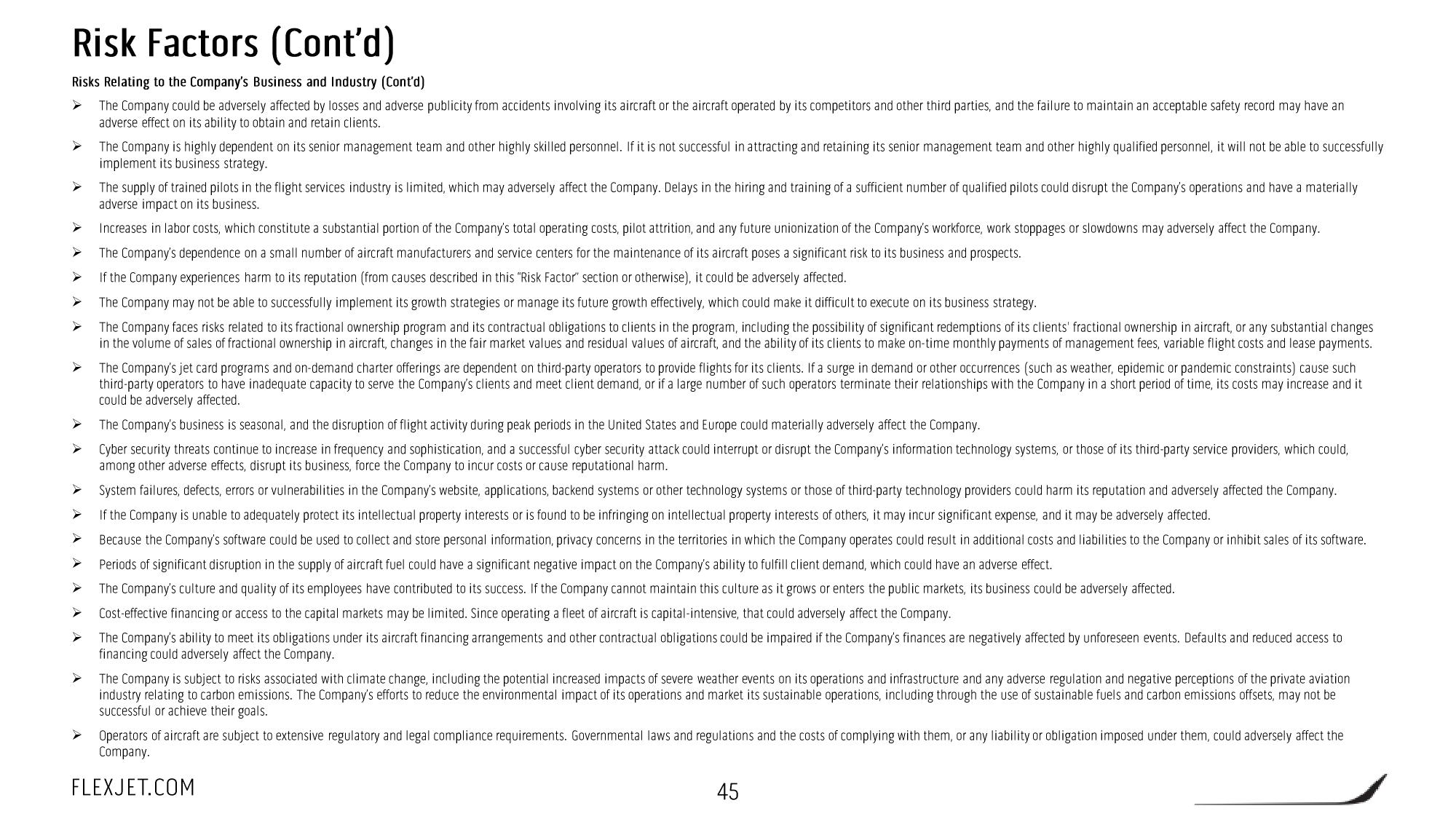FlexJet SPAC Presentation Deck
Risk Factors (Cont'd)
Risks Relating to the Company's Business and Industry (Cont'd)
The Company could be adversely affected by losses and adverse publicity from accidents involving its aircraft or the aircraft operated by its competitors and other third parties, and the failure to maintain an acceptable safety record may have an
adverse effect on its ability to obtain and retain clients.
The Company is highly dependent on its senior management team and other highly skilled personnel. If it is not successful in attracting and retaining its senior management team and other highly qualified personnel, it will not be able to successfully
implement its business strategy.
The supply of trained pilots in the flight services industry is limited, which may adversely affect the Company. Delays in the hiring and training of a sufficient number of qualified pilots could disrupt the Company's operations and have a materially
adverse impact on its business..
Increases in labor costs, which constitute a substantial portion of the Company's total operating costs, pilot attrition, and any future unionization of the Company's workforce, work stoppages or slowdowns may adversely affect the Company.
The Company's dependence on a small number of aircraft manufacturers and service centers for the maintenance of its aircraft poses a significant risk to its business and prospects.
If the Company experiences harm to its reputation (from causes described in this "Risk Factor" section or otherwise), it could be adversely affected.
The Company may not be able to successfully implement its growth strategies or manage its future growth effectively, which could make it difficult to execute on its business strategy.
The Company faces risks related to its fractional ownership program and its contractual obligations to clients in the program, including the possibility of significant redemptions of its clients' fractional ownership in aircraft, or any substantial changes
in the volume of sales of fractional ownership in aircraft, changes in the fair market values and residual values of aircraft, and the ability of its clients to make on-time monthly payments of management fees, variable flight costs and lease payments.
The Company's jet card programs and on-demand charter offerings are dependent on third-party operators to provide flights for its clients. If a surge in demand or other occurrences (such as weather, epidemic or pandemic constraints) cause such
third-party operators to have inadequate capacity to serve the Company's clients and meet client demand, or if a large number of such operators terminate their relationships with the Company in a short period of time, its costs may increase and it
could be adversely affected.
The Company's business is seasonal, and the disruption of flight activity during peak periods in the United States and Europe could materially adversely affect the Company.
Cyber security threats continue to increase in frequency and sophistication, and a successful cyber security attack could interrupt or disrupt the Company's information technology systems, or those of its third-party service providers, which could,
among other adverse effects, disrupt its business, force the Company to incur costs or cause reputational harm.
System failures, defects, errors or vulnerabilities in the Company's website, applications, backend systems or other technology systems or those of third-party technology providers could harm its reputation and adversely affected the Company.
If the Company is unable to adequately protect its intellectual property interests or is found to be infringing on intellectual property interests of others, it may incur significant expense, and it may be adversely affected.
Because the Company's software could be used to collect and store personal information, privacy concerns in the territories in which the Company operates could result in additional costs and liabilities to the Company or inhibit sales of its software.
Periods of significant disruption in the supply of aircraft fuel could have a significant negative impact on the Company's ability to fulfill client demand, which could have an adverse effect.
The Company's culture and quality of its employees have contributed to its success. If the Company cannot maintain this culture as it grows or enters the public markets, its business could be adversely affected.
Cost-effective financing or access to the capital markets may be limited. Since operating a fleet of aircraft is capital-intensive, that could adversely affect the Company.
The Company's ability to meet its obligations under its aircraft financing arrangements and other contractual obligations could be impaired if the Company's finances are negatively affected by unforeseen events. Defaults and reduced access to
financing could adversely affect the Company.
The Company is subject to risks associated with climate change, including the potential increased impacts of severe weather events on its operations and infrastructure and any adverse regulation and negative perceptions of the private aviation
industry relating to carbon emissions. The Company's efforts to reduce the environmental impact of its operations and market its sustainable operations, including through the use of sustainable fuels and carbon emissions offsets, may not be
successful or achieve their goals.
Operators of aircraft are subject to extensive regulatory and legal compliance requirements. Governmental laws and regulations and the costs of complying with them, or any liability or obligation imposed under them, could adversely affect the
Company.
FLEXJET.COM
45View entire presentation